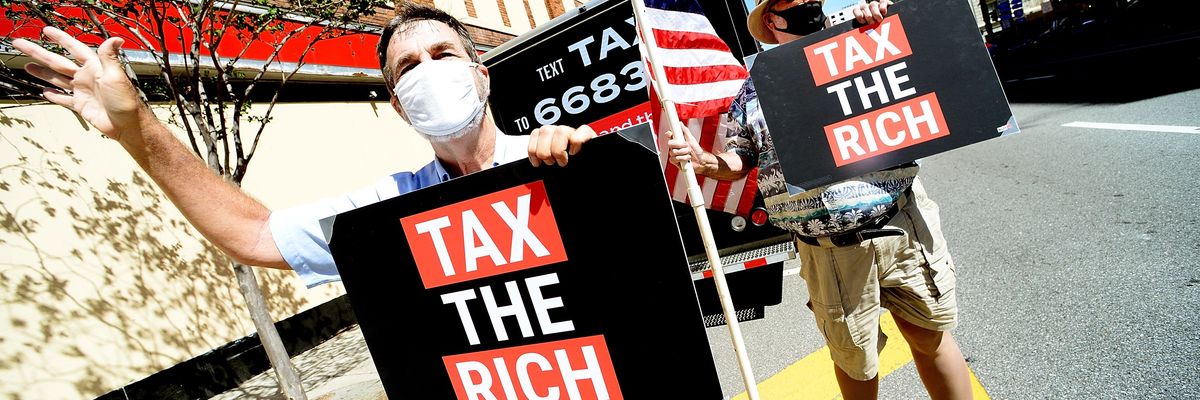After every big election, there’s a spotlight on the candidates that came out on top: Who’s in and who’s out, talk about mandates, seat margins, and the First 100 days.
There’s plenty of policy previews about next year.
But one issue will have a starring role both in Washington, D.C. and in states across the country—taxes.
We know Republicans in Washington are writing a play to extend and even expand President-elect Donald Trump’s 2017 tax cuts. And nearly every state will have to adapt to additional fiscal pressures while also finding ways to pay for the things our families and communities need.
We know the vast majority of Americans want the rich to pay more, not less, in taxes—at both the state and federal level. It’s time for elected officials to give the people what they want after years of disappointing performances.
Past sessions foreshadow how anti-tax elected officials around the country will act on behalf of their donors: Each time Republicans have held a trifecta in Washington this century, they’ve demanded tax cuts for the rich. During Covid-19, 26 states cut taxes, often targeting top earners, which will cost $124 billion by 2028.
We’ve seen this show before and it stinks.
The plot is tired, unbelievable, and relegates voters to a bit part, when it’s our communities that should be the lead. How many times do we have to listen to the same trickle-down economic nonsense? It’s getting old.
Polling shows that voters would rather politicians play it straight and raise revenue from big business and the wealthy rather than feel the squeeze as tax cuts lead to budget cuts to the programs and services our kids and communities need most.
Flipping the script on tax cuts for the wealthy is a core reason the State Revenue Alliance was created. Voters feel the economy isn’t working for them and want corporations and billionaire CEOs to pay their fair share. Ultimately in 2025, it’s the people who’ve too often been shut out of policy debates who will fight for tax justice and change the trajectory of tax policy in this country.
Knowing that 2025 would see a confluence of tax fights at the state and federal level, state-based advocates have spent years building coalitions of pro-revenue champions committed to working together and will have the resources to fight for good schools, housing affordability, and accessible healthcare in legislatures around the country.
Together, we’ve made real, tangible, and, yes, sustainable progress in our collective efforts to win pro-revenue policies. In 2024 alone, state-based grassroots organizations, labor groups, policy shops, and legislators supported 35 tax justice bills in state capitols. Six of those bills passed and were signed into law. Those bills included wealth taxes; corporate tax reform; reinstatement or creation of capital gains taxes; repealing certain tax breaks, which too often allowed the wealthiest to shield their assets; and more.
In anticipation of this year, we are already tracking nearly 50 tax justice bills filed in state capitols. When legislative sessions open early next year, our allies will be ready, putting forth a compelling case for ensuring the wealthiest and big corporations pay their fair share at the state level so everyone has a fair shot to survive and thrive.
Rather than divide us, taxes will be an issue that unites community voices across the country in 2025. In addition to our focus on tax justice in states, we will join hundreds of national organizations to demand Congress forgo any additional tax cuts for the wealthy and advocate for new revenue.
An extension of the 2017 Tax Cuts and Jobs Act (TCJA) will further reward the wealthiest individuals and big corporations with myriad tax breaks and benefits. We know it will come at the expense of working and middle-class families, costing us an estimated $4.6 trillion over the next 10 years. Extending the TCJA also puts additional strains on states and localities to make up potential funding gaps, as they rely on federal dollars for everything from schools to healthcare, critical infrastructure, and more.
We know the vast majority of Americans want the rich to pay more, not less, in taxes—at both the state and federal level. It’s time for elected officials to give the people what they want after years of disappointing performances.
As storylines develop following the 2024 election, progressives should consider the action in the states around taxes—who pays what they owe, who benefits from them, and whether or not they raise the revenue to fully fund our futures—as the biggest and most unifying fight on the horizon.
If we are successful, 2025 will reveal a more just, equitable, and sustainable tax code that helps build the future our communities deserve.
